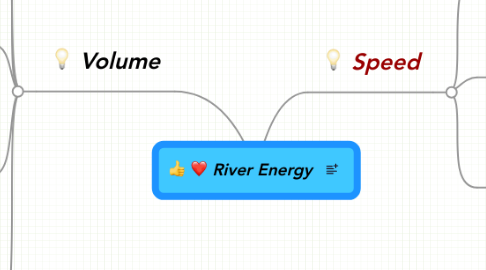
1. Volume
1.1. Presence of vegetation
1.1.1. Sparse vegetation intercepts less rain water and increases surface runoff = Volume of water is larger
1.1.2. Abundant vegetation allows more rainwater infiltrate the ground reducing surface runoff. Less surface runoff = volume of water is smaller
1.2. Amount of rainfall
1.2.1. Higher rainfall = greater volume = more discharge
1.2.2. Lower rainfall = smaller volume = less discharge
1.3. Duration of rainfall
1.3.1. Longer duration of rain = greater volume of flow = more discharge
1.3.2. Shortage duration of rain = smaller volume of flow = less discharge
1.4. Size of drainage basin
1.4.1. Smaller drainage basin = small surface area = less water collected D:
1.4.2. Bigger drainage basin = greater surface area = more water collected! :D
1.5. Permeability of rocks
1.5.1. Permeability means the capability of rocks that allows water to flow through its pore spaces
1.5.2. More permeable = more rainwater seeps into the ground = less surface runoff. = The river volume will be smaller
1.5.3. Less permeable = more surface runoff = larger volume of water in its channel
2. Speed
2.1. Gradient of channel
2.1.1. Steeper slope = faster speed of river flow
2.1.2. Gentler slope = lower speed of river flow
2.2. Texture of riverbed
2.2.1. smoother river bed = less friction = higher speed of flow
2.2.2. Roughter river bed = more friction = slower speed of flow
2.3. Wetted Perimeter
2.3.1. Shape of channel affects wetted perimenter. Wetted Perimenter = large = more water comes in contact with channel
2.3.2. Small wetted perimeter = less friction = river moves faster
